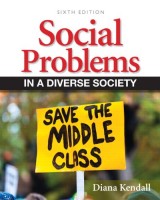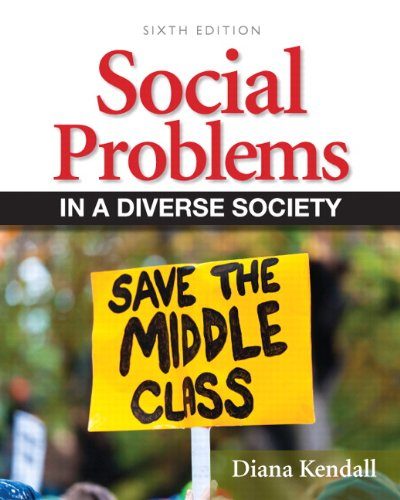 Author: Diana Kendall
Author: Diana Kendall
Publisher: Pearson – 474 pages
Book Review by: Sonu Chandiram
The author Diana Kendall shows us in this book that social problems occur and persist in the United States and around the world because of social inequality. She shows us further that age, class, gender, and race are key factors in our understanding of social problems in most societies. She points out that some other causes of social problems, particularly in the international arena, are ethnicity and nationality.
In my opinion, and as amply evidenced by the numerous acts of terrorism and fighting around the world, religion is also an important cause of social problems and inequality in many societies. I would also add income as another factor but I believe that is covered under “class.”
There are numerous factors that affect social problems, and most people have in their minds, what they hope, are the right solutions to them. What this book does is empower you to think about these problems and come up with possible solutions as a social scientist or sociologist would. Ms. Kendall enables you, through this book, to take a step back and perceive society’s ills and injustices from a larger and farther perspective.
A look at this book’s brief contents below shows you the myriad factors that are causes or effects of social problems, or are somehow related or connected to one another. Looking at them in a systematic way as they are presented in this book, enables you to develop that larger perspective I mention above. It also can hopefully help you develop a balanced approach to problems, and solutions that are the result of examining data, instead of being based on your personal opinion.
- Studying Social Problems in the Twentieth Century
- Wealth and Poverty: U.S. and Global Economic Inequality
- Racial and Ethnic Inequality
- Gender Inequality
- Inequality Based on Age
- Inequality Based on Sexual Orientation
- Prostitution, Pornography, and the Sex Industry
- Alcohol and Other Drugs
- Crime and Criminal Justice
- Health Care Problems of Physical and Mental Illness
- The Changing Family
- Problems in Education
- Problems in Politics and the Global Economy
- Problems in the Media
- Population, Global Inequality, and the Environmental Crisis
- Urban Problems
- Global Social Problems: War and Terrorism
- Can Social Problems Be Solved
The organization and presentation of materials in this book as a whole and in the chapters in particular is uniformly excellent. Each chapter begins with a reminder to “think sociologically,” and presents basic questions relating to the chapter title in bullet-point format.
Look the chapter 2 for example, Wealth and Poverty: U.S. and Global Economic Inequities, which is a topic I am keenly interested in because I believe the main cause of much conflict between and among people is money and access to it through business and employment opportunities. The data presented on the extent of these inequities is sobering, to say the least.
But let us go back to looking at the features presented in each chapter. Besides the bullet points at the start of each chapter, learning is made easier for the student with these items:
- Did You Know? mini boxes
- Social Problems in Global Perspective (or in the Media, etc.) sections
- Charts, maps, tables, and other means of presenting data
- Photos that help connect with, and illustrate reality
- Critical Thinking and You sections
- Summary
- Key Terms
- Questions for Critical Thinking
- Succeed with MySocLab
You can use the online resources available to you at MySocLab to enhance your learning. Go to http://www.pearsonmylabandmastering.com/northamerica/mysoclab.This is an engaging student and faculty learning system for sociology courses. It allows students to test their mastery of the concepts in the book by providing chapter-by-chapter diagnostic pre-tests, post-tests, and exams all of which have been revised for the Census Update edition of the text.
Results from the diagnostic tests build a customized study plan and students are provided rich supplementary content, including flashcards and recommendations for further reading, to help them learn any concepts they have not yet mastered. To order this text with MySocLab use ISBN 0-205-87789-3. For over 10 years instructors and students have reported better grades through increased engagement and real-time insights into progress.
Diana Kendall is affiliated with Baylor University.







